Latest News
In Focus: Padma Rangarajan
Padma Rangarajan
Mellon Humanities Fellow
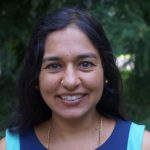 Department: English
Department: English
Rank: Associate Professor
# of years at UCR: 3
Top three texts I would take to a desert island: The Mahabaratha, A Time of Gifts, David Copperfield.
Favorite shows to stream: Sci-fi shows from the ‘80’s and ‘90’s. I love Star Trek: Deep Space Nine, Babylon 5, all that stuff.
Something people might be amazed to know about me: My father pierced my nose. It took him three tries.
An “adventure” I am looking forward to, post-pandemic: Hugs. All the hugs.
Q: My research agenda summed up in one sentence:
I study the literature and history of the British Empire.
Q: Any specific time period within the history of the empire?
My work focuses on complicating easy assumptions about Empire in the 19th century specifically, and the nineteenth century in general. It is such a pivotal period for understanding our present conceptions of culture, race, culture, and the globe.
Q: What can you tell us about your current project?
My book in progress, Thug Life: The British Empire and the Birth of Terrorism, locates the origins of modern terrorism in nineteenth century imperial literature and history.
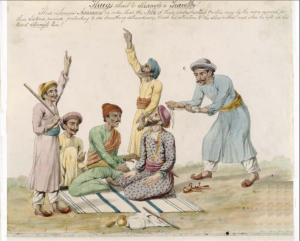
Image text reads “Thugs about to strangle a traveler! These infamous Assassins in order that the neck of their unsuspecting victim may be the more exposed for their Satanic purpose, pretending to see something extraordinary, direct his attention to the stars or skies! and when he lifts up his head strangle him!” Source: Dialogues with Thugs and Narratives of Murders (1825-40).
Q: How did you get interested in the literary origins of terrorism?
Several years ago I came across a presentation on cybersecurity by someone working in the Department of Defense. It argued for the legitimacy of the Guantanamo Bay detention center by linking it to policing in British India (and Indiana Jones!). It was such a striking connection that I had to pursue it further.
Q: What do you say when people ask you why you love your work?
I get to spend so much of my time learning about fascinating things, and I never know exactly where my research will take me. I just spent half a day recently reading Victorian tiger-hunting narratives, which are disturbing and interesting at the same time.
Q: If you could make one change to the structure of higher education today, what would it be?
I would greatly reduce adjunct teaching and greatly expand the ranks of tenured professors. The precariousness and uncertainty of adjuncting, and the second-class status afforded to adjuncts at most universities hurts teachers and students.
Q: What have you learned about teaching from your time in the classroom?
Although it’s very tempting to simply repeat a course over and over, it’s far more valuable to experiment with different techniques for teaching a text, for teaching writing, and for getting students to connect to a text.
Q: Do you have a favorite resource that you encourage students to use?
The Oxford English Dictionary, which I tout over all others because it tracks the changing history of words over time and provides citations! For historical research it’s invaluable to know exactly when and where a word was first used. For my own project, for example, it’s so important to know that the word “terrorism” didn’t exist until the 1790’s.
Q: Have you discovered any tools or tips that enhance remote learning and/or online teaching?
I’m a low-tech instructor by choice, but tools like COVE (Central Online Victorian Educator) that allow students to virtually collaborate on editing and annotating texts are tremendously helpful for giving students dynamic access to rare/expensive texts and editions.
***
In Focus is a interview series that features faculty associates of the Center for Ideas and Society.
UC Humanities Research Institute Award Winners for 2020-21

A banner year for UCR in awards from the UC Humanities Research Institute! UCR students and faculty won 10 awards including two of the most competitive awards in the system: the President’s Faculty Research Fellowship, won by Gloria Kim (Media and Cultural Studies), and the White Graduate Student Scholarship in Medicine & Humanities won by Jared Smith (Philosophy). Kudos to all applicants and this year’s awardees!
✪ Multicampus Graduate Student Working Group
XIX to XXI: Bringing Spanish language in California to the forefront
Álvaro Gonzelz Alba, Hispanic Studies, UC Riverside
Evelyn Gamez, Spanish and Portuguese, UC Davis
✪ Short-Term Collaborative Research Residency
Reading for Infrastructure, Infrastructure for Reading
Susan Zeiger, English, and Kameron Sanzo, English, UC Riverside
With Adriana Johnson, Comparative Literature, UC Irvine
✪ Editors’ Residency
Moving in the Midst: Critical Indigenous Dance Studies
Jacqueline Shea Murphy, Dance, UC Riverside
Maria Regina Firmino-Castillo, Dance, UC Riverside
✪ The Andrew Vincent White and Florence Wales White Graduate Student Scholarship (Medicine & Humanities)
The Moral Psychology of Obsessive-Compulsive Disorder
Jared Smith, Philosophy, UC Riverside
✪ University of California President’s Faculty Research Fellowship
The Microbial Resolve: Visualization, Speculation, and Security
Gloria Kim, Media and Cultural Studies, UC Riverside
✪ Graduate Student Dissertation Support
Exposed Flesh: A Literary History of Black Being
Sarah Buckner, English, UC Riverside
✪ Conference Grant
Co-Productions: Literature, Media, and Diaspora in the Japanese Transpacific
John Kim, Comparative Languages and Literatures, UC Riverside
✪ Junior Faculty Manuscript Workshop
Indigenous Inhumanities: California Indian Revitalizations and Postapocalyptic Research
Mark Minch-de Leon, English, UC Riverside
✪ Engaging Humanities Grant
Re-Visioning Abolitionist Futures: Beyond the Walls
Setsu Shigematsu, Media and Cultural Studies, UC Riverside
✪ Fall 2020 Residential Research Group
Disciplining Diversity
Mariam Lam, Comparative and Ethnic Studies, UC Riverside (Convener)
Congratulations to the following Center for Ideas & Society award winners!
Conference Awards
¡Que Viva Mexico! – Transnational Film and Audiovisual Art
Paulo Chagas (Music)
Nikolay Maslov (Culver Center of the Arts)
Co-Productions: Literature, Media and Diaspora in the Japanese Transpacific
Anne McKnight (Comparative Literature)
John Kim (Comparative Literature)
Setsu Shigematsu (Media & Cultural Studies)
Traise Yamamoto (English)
Catherine Gudis (History)
(Re)Draft Manuscript Revision Workshops
Undocumented Desires: Fantasies of Latino Male Sexuality
Richard Rodriguez (Media & Cultural Studies)
The ‘Falls’ of Rome: Transformations of the City in Late Antiquity (270-603 CE)
Michele Salzman (History)
Interdisciplinary Working Group Awards
Global 19th Century
Susan Zieger (English)
Jonathan Eacott (History)
Heidi Brevik-Zender (Comparative Literature/French)
Fatima Quaraishi (History of Art)
Making Space: Emerging Theories and Interventions in Critical Anti-Violence Research
Alisa Bierria (Ethnic Studies)
Andrea Smith (Ethnic Studies)
Retaining and Promoting Diverse Faculty: Intellectual Engagement and the Second Book Project
Victoria Reyes (Sociology)
Jade Sasser (Gender & Sexuality Studies)
Political Economy Seminar
Jana Grittersova (Political Science)
Matthew Mahutga (Sociology)
Success! Book manuscript workshop hosted online
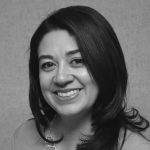
The Faculty Commons Latinx & Latin American Studies Workgroup recently hosted an online book manuscript workshop for Xóchitl Chavez (Music), who found the virtual workshop to be very helpful. “I’m sure it would have been nice to share a meal to build further collegial ties,” she said, “but otherwise what is essential at this point is the content from the workshop.” All the participants in the two-hour Zoom session agreed, calling the workshop a “success” and a “great template” for future virtual meetings.
For tips on virtual manuscript workshops, contact us at CISevents@ucr.edu.
Intellectual community just got an upgrade
Dear colleagues,
In these stressful times, the work of building community is more important than ever. We’re re-designing our book talks, panel discussions, and reading groups so that you can join in online – where ever you are. As we develop our plans, we would love to hear your ideas for meetings, events or programs that help keep us all in engaged and moving forward. Email us at CISevents@ucr.edu.
Check back soon for more details!
In Focus: Matthew King
Matthew King
Mellon Humanities Fellow
 Department: Religious Studies
Department: Religious Studies
Rank: Associate Professor
# of years at UCR: 5 years
Top three texts I would take to a desert island: Sakya Paṇḍita Sakya Lekshé, Annie Dillard Teaching a Stone to Talk, Michel de Certeau Heterologies.
Favorite thing: a guitar and Anstruther Lake in my Canadian homeland of Kawartha Highlands Provincial Park.
Favorite films: Three documentaries that I have seen in recent years that I regularly bring to my students—all imperfect portraits but which tend to leave viewers aching to think, act, and imagine better—are Happiness: TV Reaches Bhutan,Unmistaken Child, and Qapirangajuq: Inuit Knowledge and Climate Change.
Website: ucriverside.academia.edu/MatthewKing
Q. Your research agenda summed up in one sentence:
The social history of knowledge in late-and post-imperial Inner Asia, often paired with a history of the eastward circuit of humanist knowledge from Europe.
Q. Does your work explore a central question or theme?
Broadly speaking, the central problem I am trying to solve: How do communities come to know their past authoritatively in relation to global circuits of discourses and knowledge practices developed elsewhere.
Q. What can you tell us about your current project?
My current project: Examines a circuit of translations of a famous Chinese travel narrative entitled Record of Buddhist Kingdoms (Ch. 佛國記,Foguoji) by the Chinese Buddhist monk Faxian (法顯, 337-422 CE), one of pre-modern Asia’s most ambitious wanderers. I am exploring an Eurasianist circle of translation from the 19th century that brought Faxian’s text to European, Siberian, Tibetan, and Mongolian readers for the first time. In addition to providing an annotated translation of the Tibetan and Mongolian versions of this text, my book will explore the ways that these translations (and their hundreds of footnotes) helped invent “Asia,” “Buddhism,” and the “Silk Road” as contested objects of knowledge between the academy and the monastery and across the frontiers of the West/nonWest.
Q. What else have you been up to, in addition to your current project?
Recently, I have returned from a research fellowship at the Center for Advanced Study at the University of Leipzig, where I developed new work as part of a wonderful working group focusing on “secularisms in pre-modern Asia.” I am spending this academic year (very gratefully) as a Mellon Foundation second project fellow at the Center for Ideas and Society on the book described above. At the moment I am also spending quite a bit of time giving talks about my recently published first book, Ocean of Milk, Ocean of Blood: A Mongolian Monk in the Ruins of the Qing Empire(Columbia University Press, 2019).
Q. What do you love about the work you do?
No other career pushes you to the very edge of what you are capable of conceiving and undertaking technically (ie. dealing with other languages, other modes of representing and inscribing the human imagination, other traces of tying human life to place and time, etc.).
Q. What has the experience of teaching taught you?
[T]hat the only authority I have as a teacher is when I am genuinely inhabiting the space of an inspired learner.
Q. What would you change about the academy, if you could?
That we could acknowledge: 1) our very troubling role in deepening forms of social inequality (through, for example, the mass burden of student debt our institutions inflict and that pay our salaries); and 2) our professional implication in creating a massive and I would say mostly indefensible carbon emissions imprint through our rituals of plane travel and professional meetings.
Q. One amazing fact about you…..
I once found a dinosaur bone in the South Gobi Desert in the company of an incarnate Buddhist lama leading a small shih-tzu on a bedazzled leash. (We buried it after taking some pictures and you’ll never find it!)
In Focus is a new interview series that features faculty associates of the Center for Ideas and Society.
In Focus: Marissa Brookes
Marissa Brookes
Mellon Humanities Fellow
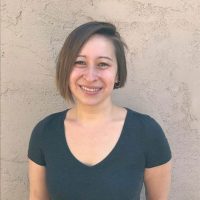 Department: Political Science
Department: Political Science
Rank: Assistant Professor
# of years at UCR: I am in my 7th year now.
Top three texts I would take to a desert island: Karl Polanyi’s The Great Transformation; Theda Skocpol’s States and Social Revolutions;
Howard Zinn’s A People’s History of the United States
Currently listening to: Dillinger Four, Naked Raygun, Danny Brown, Malibu Ken
A favorite record I encourage students to listen to is: Propagandhi’s 1993 How to Clean Everything. It’s a political punk classic.
Website: researchgate.net/profile/Marissa_Brookes
Q: Your research agenda summed up in one sentence:
I study the politics of labor in the global economy, including how workers’ transnational activism influences employers to create and maintain “good jobs” (secure, stable, and gainful employment) in both advanced and developing countries.
Q: What contribution do you see your work making to research in this area?
Broadly speaking, the essential contribution of my research is in showing how globalization creates unique forms of power for workers, which they exercise in attempt to compel corporations to improve working conditions and protect labor rights.
Q: What questions are you currently exploring?
My current project, “Bringing Labor Back In: How Histories of Conflict Tame Corporate Power Over Time,” investigates labor transnationalism’s long-term impact on employment relations through a comparative historical analysis of global unions’ evolving relationships with transnational corporations over three decades.
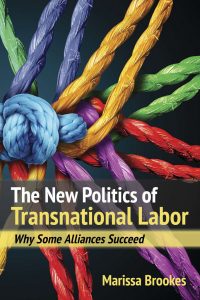
Cover of Marissa’s book: “The New Politics of Transnational Labor.”
Q. You have had a busy year! What have you been up to?
Recently, I published my first book (The New Politics of Transnational Labor, 2019, Cornell University Press), presented a new paper on labor in China at UC San Diego as part of a multi-campus project on Great Power Competition in the 21st Century, and traveled to Mexico City for the Southwest Workshop on Mixed-Methods Research, an annual conference I co-founded and co-organize.
Q. When friends and family ask you what you love about your work….
Q. What have you learned from teaching students at UCR?
The most valuable lesson teaching has taught me is that students excel when they feel genuinely connected to their course material, their classmates, and their professors. They have to feel connected. They have to care. And they have to know that I care too. Only then do students develop the level of deep interest and active engagement necessary for systematic analysis and the development of critical thinking skills.
Q. If you had the power to change the academy in some way, what would you do?
If I could change one thing about the academy, it would be to eliminate the economic barriers that prevent bright, hardworking individuals from reaching their full potentials.
Q. What might people be surprised to know about the inspiration for your research?
My work is inspired by the difficult, exhausting jobs my family members have had to work over the years and the opportunities I have had for socioeconomic mobility. My mother immigrated to the US from the Philippines during the Marcos regime and never got to finish her degree. My father is a Vietnam veteran who was not encouraged to pursue a college education by his factory-worker father and extended family of coal miners. I feel fortunate and enormously privileged to be able to study the politics of work and employment as a professor at UCR.
In Focus is a new interview series that features faculty associates of the Center for Ideas and Society.
In Focus: Jody Benjamin
Jody Benjamin
Participant, Committee on African Studies
Q. Your research agenda summed up in one sentence:
My research focuses on western African history (Senegal, Mali, Guinea) during the eighteenth and nineteenth centuries, and includes questions of African Diaspora and transnational history.
Q. Broadly speaking, what is the key aim of your research?
To center the significant contributions of continental African history both to the “early modern” period and to contemporary realities; and to push the conversation beyond standard approaches to the Atlantic slave trade and colonialism in Africa.
Q. What is your current project?
“The Texture of Change: Cloth, Commerce and History in Western Africa, 1700-1850.” In it, I explore how people across space and time deployed textiles and dress to claim individual or group status. I argue that choices made within a set of ecological, political and economic constraints structured networks connecting the Atlantic and Indian Ocean perimeters in the pre-modern era.
Q: Why study textiles, in particular?
Textiles were a major industry within the entire West African region going back centuries. They also were the biggest “global” industry of the period I study. At the heart of what became the Industrial Revolution.
Q. Any new developments in your work?
Recently, I received a fellowship from the National Endowment for the Humanities to complete my first book. I have been invited to give a talk about my research this fall as part of the Distinguished Africanist Lecture series at the University of Chicago this fall.
Q. When friends and family ask what you love about your work, how do you answer?
I tell them that I get to spend time learning deeply about people, places and processes that have shaped our contemporary lives in ways large and small. Then I get to share what I’ve learned with other scholars, students and different audiences all over the world. How awesome! (Don’t mention all the long hours, though!)
Q. A favorite podcast:
Africa Past and Present: the podcast about African history, culture and politics (afripod.aodl.org); Afropop Worldwide with Georges Collinet (afropop.org).
Q.What have you learned from teaching?
That less can be more. Capturing a student’s genuine interest and giving them tools to take ownership of a particular topic or set of questions makes for much better learning than lots of lecture slides and tons of reading. Mix it up. Try new things. Once you earn their buy-in, amazing things are possible.
Q: If you could change one thing about the academy:
I would like to see an academy where scholars were generally more reflective about their enormous privileges (yes, you’ve earned them, but then what?), more conscious about the (non-verbal) messages they send to students and society, more generous toward their colleagues, and more deliberate about paying it all forward.
Q. Something people might be amazed to know about you:
I got my love of reading from generations in my family. I inherited a large library of books and music from my grandfather who was an autodidact because he had to be. I am the first in our family to (have the opportunity) to earn a doctorate and work as a scholar.
—
In Focus is a new interview series that features faculty associates of the Center for Ideas and Society.
In Focus: Victoria Reyes
Victoria Reyes
Participant, Mellon Advancing Intercultural Studies, Contested Histories Seminar
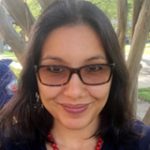 Department: Sociology
Department: Sociology
Rank: Assistant Professor
# of years at UCR: Entering 4th year at UCR but 3rd year on campus because during my first year I was on leave for a Postdoc at University of Michigan
Top three texts I would take to a desert island: This is a difficult one…I’d say I would take my phone and internet connection
Favorite thing: Philippine brand dried mangoes
Website: www.victoriadreyes.com
Q. Your research agenda summed up in one sentence:
I study culture, borders, and empires.
Q. Is there a specific question that arises in the intersection of these topics?
The question of territoriality – what is it? What does it look like in practice and on-the-ground? How has it changed over time?
Q. You have a new book out- congratulations!
Yes, thanks! I recently published my first book, Global Borderlands: Fantasy, Violence and Empire in Subic Bay, Philippines (Stanford University Press), and received an AAUW Postdoctoral American Fellowship to work on my second project during 2019-2020. Read UCR News article about Reyes’ book >>
Q. Why ‘borders’ in particular? What sparked your interest?
My initial interest was sparked by my grandmother’s migration story through marriage to a US serviceman. Her nostalgia of the former base in the Philippines clashed with my undergrad classes on empire. I was also fascinated by what sociologists call the socio-cultural boundary-making within the Filipino American community as my grandmother was ostracized, in part because marriage migration can have a stigma of sex work attached to it.
When I went to Subic Bay, Philippines, home to a former US naval base, the differences between inside what was now a special economic zone and outside further intrigued me and the first time I saw a military ship docked, I remembered my grandmother’s awe.
So the borderlands I’m interested in are what I call global borderlands – legally ambiguous places (like overseas military bases, special economic zones, embassies, cruise ships and the like) where rules of life differ within their walls and which are symbolically seen as either arms of empire or as ways to be a part of a modern, cosmopolitan community. It’s this tension that I’m fascinated by.
Q. What are you working on now?
My current project is on reputation of places, how it is differently racialized and gendered by authors and audiences. I’m particularly interested in state attempts to shape place reputation and how that compares to narratives of places on-the-ground.
Q. What do you love about your work?
Everything! I love being able to research what I want, teach interesting subjects to bright students and engage in service work I find fulfilling.
Q. What is your top ‘take away’ from teaching?
The most valuable lesson that teaching has taught me is that the classroom is a partnership between myself, the TAs, and each student. We all learn from one another. Each and every student has something to contribute and I find UCR students to be inspiring.
Q: Given that you love your work, if you could change one thing about the academy….
It would be for the academy to be more inclusive. I dedicate my service time to DEI issues (whether on the UCR Senate’s Diversity, Equity and Inclusion committee, writing advice columns, or establishing new awards for grad students, publicly engaged work and teaching).
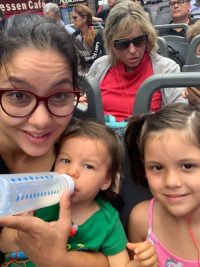 Q. Do you have a favorite podcast to recommend?
Q. Do you have a favorite podcast to recommend?
I’ve been listening to the podcast “Stay Tuned with Preet” which is hosted by Preet Bharara, a former US Attorney for the Southern District of New York. It’s an informative take on contemporary U.S. politics under the Trump administration and he and his guests break down what various indictments, reports, and other legal matters mean in lay terms (e.g., like the Mueller Report).
Q. Any interesting facts about you that might surprise people?
I have aphantasia, which means I have zero visual processing and don’t have a “mind’s eye.” I always thought comments like “day dreaming” or how characters looked different on screen than how they imagined when reading books were metaphors! It amazes me that other people can visualize things. I’m also a true crime buff and spend whatever free time I have (which isn’t a lot with a 5 year old and a 1 year old!) reading about unsolved mysteries.
—
In Focus is a new interview series that features faculty associates of the Center for Ideas and Society.
In Focus: Juliet McMullin
Juliet McMullin
Convener, Inequities in Health, Faculty Commons Project
Juliet’s Stats:
Department: Anthropology
Rank: Professor
Years at UCR: 14
Favorite Thing: Chocolate. It is such a favorite thing that I host bi-annual chocolate parties.
Book I’m reading right now: Heart Berries by Terese Marie Mailhot.
Personal Website: www.julietmcmullin.com
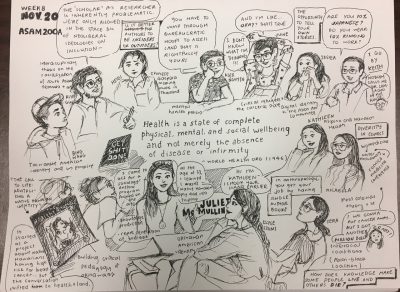
Comic of Juliet’s visit to the 2018 Asian American History graduate seminar at UCLA by Angel’s Talitha Trazo.
Q. Your research agenda summed up in one sentence:
My research agenda is designed to examine the production of inequality and its manifestations in health and wellness.
Q. Are there particular questions that stand-out for you within this framework?
While the topic of my research is health inequalities, I really see the problem that my research engages as inclusion and community building. I am curious about how we include different perspectives while building a common project. What do we do with voices/bodies that don’t conform? What is the role of storytelling in community building? Do we make spaces that respect difference, respect different experiences and stories? Or do we silence and segregate? How we define, experience, and organize ourselves produces specific forms of inequity that allow some to thrive and exacerbate suffering for many.
Q. What project are you working on now?
That’s a funny question because I typically have at least three ongoing projects that delve into different facets of the questions that interest me. I’ll just mention two projects now. One project is a community engagement effort with Riverside/San Bernardino Indian Health and tribal community members. We are collaboratively developing a historical trauma curriculum for health care providers who serve Native people. Too often, when physicians come to work for Indian Health Services they have no knowledge about the history of Native people and how that history affects their health. Indeed, many in this area don’t know that these are the current and ancestral lands of the Cahuilla, Tongva, Serrano, Luiseño, Cupeño and Kumeyaay Peoples. The content of our curriculum will honor the individual, historical and political experiences of these tribes that physicians need to know in order to provide better care. The second project that gives me a lot of joy builds on my long term work in the relations of cancer. For this project I am working with people who have been diagnosed with cancer to create comics about their medical and personal experiences. This is both a narrative/life history project and a project that explores how storytelling in the form of comics enhances personal and interpersonal understandings that might improve health and wellbeing. Finally, in my spare time, I am working on an ethnography of the graphic medicine community. Thinking around how this diverse group of artists and scholars come together around the comics medium, and how they engage the inherent inequities in our medical systems.
Q. Any recent developments on these projects, or other ideas that you’ve been working on?
The historical trauma project is supported by a community engagement award from Patient Centered Outcomes Research Institute. Our research group, faculty and community members, are planning our trip to Aotearoa to present our work at the Native American and Indigenous Studies Association Conference. My colleague Kristyn Pellecchia and I recently received funding from the CSU Palliative Care Institute for a project to build a Humanities based curriculum for medical students on Death and Dying. I have a few papers from each of these projects, that have been developed and written in collaboration with graduate students, colleagues, and community partners. And in my other pocket of spare time, I’ve spent the past couple of years collaborating and developing a Minor in Medical and Health Humanities. We are awaiting final approval.
Q. What is the most valuable thing that you have learned from teaching?
Be curious. We rarely truly know what is going on in our students lives. Many students are struggling with food insecurity, housing, family and personal relationships. When they show up to class, they are bringing their best with them. What ever their best is, it is our job to use their best and to deliver on the opportunities for critical thinking and innovation that an education in a top public research university is supposed to provide.
—
In Focus is a new interview series that features faculty associates of the Center for Ideas and Society.
UCHRI Award Winners
Congratulations to the following UCR faculty and students for being awarded a UCHRI grant for the year 2019-20!
Alisa Bierria, Ethnic Studies
Feminist Anti-Carceral Research Initiative
✪ Engaging Humanities Grant
Michelle Dizon, Media and Cultural Studies
Fugitive Archives
✪ Engaging Humanities Grant
Dana Simmons, History
Humanities Careers in Science History, Policy, and Communication (H-SCHIP)
✪ Grad Professionalization Workshop Grant
Samuel Fullerton, History
Sex and the English Revolution
✪ Dissertation Award
Chelsea Silva, English
Bedwritten: Middle English Medicine and the Ailing Author
✪ Dissertation Award
Thank you for another great year!
On behalf of everyone at the Center, we want to thank you for your continued participation and support!
In addition to celebrating the Center’s 30th Anniversary, we’re celebrating another successful year of humanities-oriented programs at UCR. Over the last academic year, Center-sponsored events reached over 800 people through…
- More than 15 conferences & workshops
- Over 20 community events
- 12 faculty-led projects hosting over 50 guest speakers
- 11 faculty book talks including Emory Elliott Award winner: Close Encounters with Humankind by Sang-Hee Lee
- 27 graduate dissertation research grants
- PLUS co-sponsorship of events across campus!
What was the most memorable part of the year for you? We would love to hear your feedback!
Stay tuned for Film for Thought, a free summer documentary series!
In Focus: Amanda Lucia
Amanda Lucia
Second Project Fellow, Center for Ideas and Society
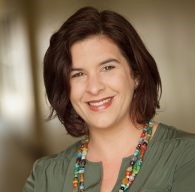
Department: Religious Studies
Rank: Associate Professor
Years at UCR: 7
Favorite Thing: Building my secret garden.
Top texts for a desert island:
Q. Your research agenda summed up in one sentence:
What do we need to change about our own thinking to make the other people’s “strange”, “ridiculous,” “outrageous,” “insane” ideas begin to seem like common sense?
Q. How does this focus play out in your work?
Each project I work on is particular to its socio-historical context, but in general my research gets close to my subject matter, through the method of ethnography, meaning the practice of participant-observation conducted while living and working among my interlocutors. From these microcontexts, situated in the broader fields of guru studies, modern global Hinduism, and its peripheries, I have tackled theoretical issues related to gender, globalization, whiteness, and power in the guru-disciple relationship.
Q. Can you give us an example of a project that demontrates your approach?
My most recent book, with a working title of, White Utopias: Yoga, Transformational Festivals, and Countercultural Spirituality, is currently under review with the University of California Press. White Utopias is a bold book that questions why countercultural spirituality, in its various forms, has been and remains consistently and predominantly white, despite its proclamation with progressive and anti-racist ideals. The book deconstructs its foundations in religious exoticism, meaning the incorporation of ‘other’ religious forms in a search for authentic meaning, and shows how this translated into contemporary practices of white viscosity (“stickiness”) and cultural appropriation. Using both strategies of empathy and critique, I present my findings as a discordant, ambivalent, and provocatively uncomfortable window into these utopian communities, one that is both euphoric and vexed. My sustained and intensive ethnographic research shows that these fields are both radically transformative for the participants involved and problematically engaged in the logics of white possessivism.
Q. What other ideas do you have brewing?
Recently, I have been writing and writing and more writing! White Utopias took me from New Zealand, to Australia, to Black Rock City (Burning Man), to Quebec, to Joshua Tree, to Switzerland, to Squaw Valley. My eight years of ethnographic research included audio recordings from more than 97 interviews, 74 spiritual workshops, and 52 yoga classes, and infinite porto-potties! This year, it has been a reprieve to step out of the field for the final intensive writing stage. While finishing up White Utopias, I was also pleased to publish an article in the Journal of the American Academy of Religions (JAAR) that leads into my next book project on sexual scandals among celebrity gurus. My article, “Guru Sex: Charisma, Proxemic Desire, and the Haptic Logics of the Guru-Disciple Relationship,” argued that the power dynamics of the guru-disciple relationship couples with the communal belief in the importance of physical proximity to the guru, and creates social environments ripe for sexual abuse (and deterrents to reporting abuse should it occur). For this project, I am the PI for a team of researchers, who have recently been awarded a five-year, $550,000 grant from the Henry Luce Foundation. With these resources, I am very excited to get back to India more frequently for research.
Q. What have you learned from sharing your research into the classroom?
I have been studying countercultural spirituality for nearly my entire life, but it was UCR students that forced me to focus on the overwhelming whiteness of these fields. Discussing these populations at other universities, often times the predominant whiteness of countercultural spirituality went unnoticed, assumed, and unremarkable. It assumed the distinction of white normativity, which enabled these spaces to transcend racialization. But for my UCR students, the whiteness of these fields served as a barrier, a marker of exclusion, and a cultural designation, that rendered them inaccessible, as they were majority non-white identifying students. (In addition, class was another important intersectional aspect that was students often raised.) Because of UCR students, I began to see the that the Orientalist fascination with India, the countercultural “hippies,” and even today’s proliferations of meditation, yoga, and spirituality, are raced and classed in defining ways.
Q. Do you have a favorite podcast or film you urge folks to see?
So many! But right now, I am teaching ethnographic methods and I always encourage my students to see Almost Famous. It’s a great story about the fraught relationships and intimacies on acquires as an ethnographer in the field and the sometimes distressing interpersonal situations that the writing and publishing process can generate.
—
In Focus spotlights faculty associates of the Center for Ideas and Society.
In Focus: Matthew Mahutga
Matthew Mahutga
Co-Lead, 2018-19 Political Economy Seminars and the Globalization, Populism and the International Order Symposium
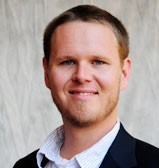
Department: Sociology
Rank: Associate Professor
Years at UCR: 10+
Favorite thing: My favorite past-time is just about anything on the Central California coast.
Fishing, hiking, food and wine are right at the top!
Text I would take to a desert island: How to Survive a Desert Island by Tim O’Shei (Capstone Press, 2019).
Q. Your research agenda summed up in one sentence:
My research examines the socio-economic consequences of political and economic change.
Q. Is your work purely theoretical, or does it have real-world implications?
Broadly speaking, I want to understand how political and economic processes that operate well beyond the control of the individual shape the life chances of individuals.
Q. What project are you working at present?
In my field, we are often working on multiple projects simultaneously. The two current projects closest to my heart examine income inequality. One focuses on both the predominant shape of income inequality, as well as its drivers. A key finding emerging from this project is that (a) distributional change in rich democracies is best described as income polarization and (b) this polarization is driven primarily by economic and political changes that work through labor markets in the “real” economy (i.e. through wages and salaries) , as well as extra-labor market processes (passive income of various kinds) that benefit top incomes (e.g. the 1%). The second project focuses squarely on the United States. Here we decompose household income inequality into a “within” and “between” racial group components to compare the impacts of socio-economic changes on household income across racial groups.
Q. If you had the authority to make one economic policy change in the U.S., what would it be and why?
My preferred policy changes in the US address the most important macro-economic changes since the late 1970s—globalization, technological change and financialization. These processes disproportionately benefit high-skill workers. Some of them also penalize low skill workers. Skills are correlated with pre-tax and transfer incomes. My one (well, maybe two) policy change would be (a) a significantly more progressive federal tax code and (b) larger transfer payments targeted at geographic areas most hard-hit by these processes. The more progressive tax code would extract revenue from those who disproportionately benefit from these macro-economic changes. The targeted transfers would help to redevelop areas that have been disproportionately harmed by these macro-economic changes.
Q. What about the other aspect of your work: teaching?
The most valuable lesson that teaching taught me is that most people (including students) don’t find the content of my work or pedagogy inherently interesting. This has caused me to consistently focus on how to be a better, more engaging teacher.
Q. Where can we find out more about your range of interests?
Interested readers can read most of my published research by visiting matthewcm.ucr.edu.
—
In Focus spotlights faculty associates of the Center for Ideas and Society.
In Focus: Anthony Jerry
Anthony Jerry
Convener, Blackness Unbound, Faculty Commons Project
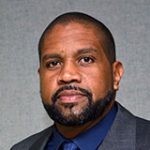
Anthony’s Stats
Department: Anthropology
Rank: Assistant Professor
Years at UCR: 3
—
In Focus is a new interview series that features faculty associates of the Center for Ideas and Society.
UCHRI Grant Award Winners
Congratulations to the following UCR faculty for being awarded a UCHRI grant for the year 2019-20!
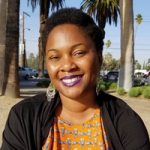 Ademide Adelusi-Adeluyi
Ademide Adelusi-Adeluyi
Department of History
Imagine Lagos: Speculative Cartography and the Making of a 19th Century African City
✪ Junior Faculty Manuscript Workshop
—
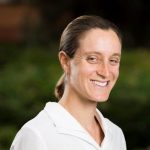 Alejandra Dubcovsky
Alejandra Dubcovsky
Department of History
At the Frontlines of a Forgotten War: Violence, Gender, and Conflict in the Early South
✪ Mid-Career Faculty Manuscript Workshops
—
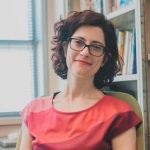 Dana Simmons
Dana Simmons
Department of History
Hungry, Thinking with Animals
✪ Mid-Career Faculty Manuscript Workshops
—
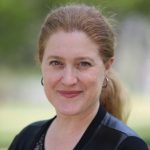 Erith Jaffe-Berg
Erith Jaffe-Berg
Department of Theatre, Film and Digital Production
Legacies of Commedia dell’Arte: “Others” and the production of theatre from early-modern Italy through modern-day California
✪ Conference Grant
In Focus: Farah Godrej
Farah Godrej
Senior Fellow, Center for Ideas and Society, 2017-2020
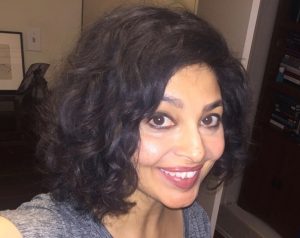 Department: Political Science
Department: Political Science
Rank: Associate Professor
Years at UCR: 12
Favorite places: Walking the Huntington Gardens in Pasadena, or strolling the coast along the Pacific Ocean. Staring at nature, whether in the form of plants, trees, fauna, or water, is a crucially rejuvenating practice.
Top three texts I would take to a desert island:
* A “wisdom” text: The Bhagavad-Gita, the self-inquiry manual I turn to again and again.
* An “intellectual” text: Karl Marx’s The Economic and Philosophic Manuscripts of 1844, which reminds us what human flourishing really looks like.
* A “comfort” text: anything by Enid Blyton (with a particular fondness for the “Mallory Towers” series), whose distintinctly English approach to children’s literature was a staple of my childhood in postcolonial India.
Summarize your research in one sentence:
My research seeks to uncover what happens to traditions like yoga and meditation when they travel from their point of origin in the Indian subcontinent, and take on new life in other times and places.
Why study yoga?
Self-care practices like yoga and meditation have now become part of a global discourse on wellness, health, and well-being. It’s easy to think of these practices as largely benign, nonviolent, peaceful and even countercultural. But less is known about the darker and more insidious side of these practices—can they function as instruments of social control in increasingly inegalitarian social and political contexts? My research shows that depending on how they are taught and disseminated, these practices can produce responses toward injustice that are either passive, compliant and docile on the one hand, or revolutionary, insurrectionist and empowering on the other.
Do you practice yoga? If so, what kind and for how many years?
I have been studying many different styles of yoga, for about twenty years. I consider myself a lifelong student of a wide variety of yogic traditions, and have been influenced most by the Iyengar and Ashtanga styles of postural practice, although I continue to train in and study many other postural styles and lineages. I also continue my decades-long study of a variety of meditative lineages, such as Kadampa and Shambhala Buddhism, vipassana, Siddha Yoga, kundalini yoga, and various secular, nondenominational variants of these practices by Western teachers such as Eckhart Tolle and Sally Kempton. My course, “The Yogic and Meditative Traditions of South Asia,” aims to give students a basic introduction to the wide array of yogic and meditative practices, especially as they evolve and travel to the West in contemporary times.
You recently received an award. Can you tell us about it?
Last year, I was awarded the University’s highest teaching honor, the Campus Distinguished Teaching Award for 2017-18. This was perhaps the greatest highlight of my twelve years at UCR, and the most rewarding moment of my career thus far.
Any tips or insights on teaching you can share?
My students can learn as much from each other as they can from me: having the confidence to both believe in and express your own views is a learned skill. Pedagogically, I owe it to them to instill this confidence in themselves, and to foster an environment in which they learn to respect themselves, not shy away from the sound of their own voice, or devalue their own intellect, while also learning to value others’ views in the same way. The transmission of information is only one aspect of our job as educators, and the true goal is for us to impart a certain kind of “humanness” and human flourishing through our dialogical interactions with them.
A favorite podcast that you encourage students to download…
Season 3 of the podcast Serial which takes us inside the most ordinary cases in the Cleveland court system, putting the absurdity and brokenness of our criminal justice system on full display.
—
In Focus is a new interview series that features faculty associates of the Center for Ideas and Society.
2019-20 Mellon Humanities Fellows
Introducing the 2019-20 Mellon Humanities Fellows at the Center for Ideas and Society.
Please join us in congratulating our colleagues who have received a year-long residency fellowship at the Center.
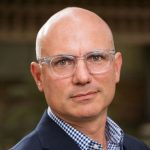 David Biggs
David Biggs
Over the next year, I will conduct a study of base-periphery shorelines in the Pacific (California, Guam, and Vietnam then continuing to sites in the Philippines, Okinawa, Hawai’i, and several atolls) with historical attention focused on the people—scientists, troops, families, refugees, laborers—and non-human life forms that circulated between them. This site-based focus will allow me to take advantage of rich troves of U.S. military records that not only document military actions but also “misfit” stories of protest, weedy invasives, and hybrid communities through texts, photography and maps, detailing what Espiritu (2017) terms the “military colonization” of the Pacific.
 Marissa Brookes
Marissa Brookes
Whether private governance is viable, let alone sustainable, is a question that has attracted great interest in recent years. To date, however, the literature on labor and private governance has focused on single-issue corporate campaigns, country-level agreements, and global framework agreements, leaving aside questions of campaigns’ and agreements’ contributions to private governance over the long run. My project thus examines labor transnationalism’s long-term impact on employment relations through an analysis of national and global unions’ evolving relationships with TNCs to hypothesize that the private governance arrangements that most effectively protect workers’ rights are those that emerge out of many years of active conflict, in contrast to top-down agreements drawn up without a historical context of struggle.
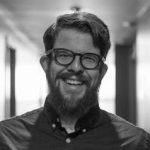 Matthew King
Matthew King
The Record of Buddhistic Kingdoms, an autobiographical adventure tale authored by one of pre-modern Asia’s most ambitious travelers—a turn of the 5th century CE Chinese Buddhist monk named Faxian—is one of the earliest and most detailed accounts of Central and South Asia’s pre-Islamic Buddhist societies and one of the few surviving accounts of life along the Silk Road. Adopting an inter-Asian frame aimed at historicizing, and thus displacing Europe as the source of modernity in Asia, this project analyzes the translations of the The Record over time to show how Orientalist scholarship was re-purposed at the frontiers of the Western episteme, setting the ragged edges of empire, nationalist movement, socialist experiments, and the bloody displacement of refugee communities into radical different times and horizons of expectation.
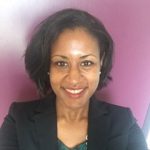 Jade Sasser
Jade Sasser
My second research project takes up questions of gendered health, environment, and technology through a focus on women’s everyday household energy use in the global South. In this project, I explore international development narratives and projects focused on distributing “improved” cookstoves to impoverished women, interventions that rest on a framework that identifies solid fuel use and traditional stoves as health and energy-related problems of the rural poor, specifically women, and that purports to alleviate the problems of gender inequality, rural poverty, and sustainable energy use through a technological solution: fuel efficient stoves.
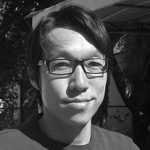 Stephen Sohn
Stephen Sohn
With this fellowship, I will complete my monograph, War Everlasting: The Militarized Technogeometries of Korean American Literature, which will be the first of its kind to showcase how Korean American literatures repurpose the technologies and vocabularies associated with war in order to imagine less violent outcomes, on the one hand, and to combat the erasures of the defenseless and the expendable, on the other. This language of warfare—or as I call it, militarized technogeometries—is deeply embedded in the writings penned by Korean Americans, conditioned by Korea’s longer history as a site of conquest and violence, and employed by these writers to reconsider who must be represented, and how survival can still be achieved (and imagined) despite the war machine’s drive to instrumentalize technology for the production of death.
Funded by a $1 million award from The Andrew W. Mellon Foundation, the Mellon Investments in Humanities Faculty grant advances the excellence of humanities scholarship at UCR by enriching research and intellectual community.
Learn more about fellowships at the Center for Ideas & Society.
Call for Graduate Fellows: Global 19th Century 2019-20 Workshops
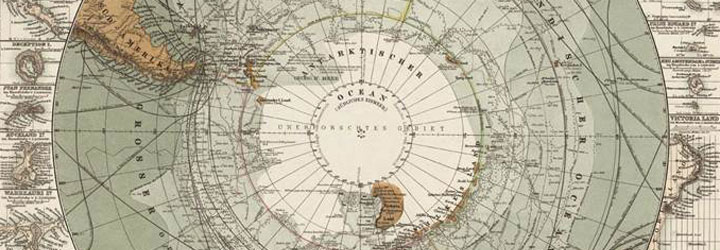
The Global Nineteenth-Century Working Group at the Center for Ideas and Society invites applications for Graduate Student Fellows in 2019-20. The Fellowship includes participation in two events:
1) A one-day, interdisciplinary workshop, loosely organized around the sub-themes of “Architectures,” “Devotional Practices” and “Empires” in the long nineteenth century, to take place on Friday, September 27, 2019. At this event, three local and three invited faculty will share works-in-progress. Graduate fellows will read these works in advance and participate fully in the discussions, lunch, and informal conversations with the faculty.
2) At a second event, to be scheduled in Spring 2020, the graduate fellows will present their own pre-circulated works in progress.
Faculty Project Coordinators
Fatima Quraishi
Art History
Heidi Brevik-Zender
French and Comparative Literature
Jonathan Eacott
History
Applications should be sent by Friday, May 3 to Katharine Henshaw (
Lalami wins leading literary prize
Laila Lalami, a creative writing professor and author of several books, is the winner of the 2019 Simpson/Joyce Carol Oates Literary Prize.
She was one of five finalists announced last month, selected from authors nominated by publishers, critics, agents, authors, and other author representatives.
Lalami, who received a $50,000 prize, said she was thrilled to receive the award and honored to be in the company of the other finalists. “This award is a wonderful gift of time, which I will use to work on my next project, a book of nonfiction about the relationship between the citizen and the state, exploring the ways in which it can be undermined by race, gender, and national origin,” she said. “This is a book I have been writing for a while, but it feels especially pressing at this particular moment in American history.”
The Simpson Literary Prize has been awarded annually since 2017 by the Simpson Project, a collaboration of the Laffayette Library and Learning Center Foundation and UC Berkeley’s English Department.
Joseph Di Prisco, chair of the Simpson Literary Project, said Lalami stood out with her “magnificently accomplished works of fiction” as well as her stylish and powerful essays and opinion pieces. “Ms. Lalami brilliantly guides us through the labyrinth of the past, and she illuminates the shadowy stories of our lives here and now, wherever and whoever we are,” he said.
In Focus: Stephen Sohn
Stephen Sohn
Senior Fellow, Center for Ideas and Society, 2017-2020
Mellon Term Professor 2019-2020
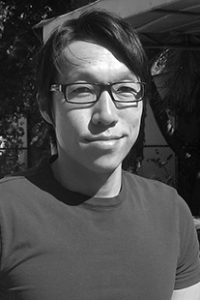 Stephen’s Stats:
Stephen’s Stats:
Department: English
Rank: Professor
Years at UCR: 5 years
Favorite sport: Tennis
Current favorite television show:
Q. Summarize your research in one sentence…
I am interested in thinking deeply about literature and culture in all of its myriad forms, so I read a lot.
Q. Does your work center on a main idea or theme?
Broadly speaking, the central issue I am concerned with necessarily involves how we simultaneously engage the political and aesthetic dimensions of literature and culture.
Q: What are you working on now?
My current project explores depictions of war and violence in Korean American literature.
Q: Any teaching tips or great resources to share?
The most valuable lesson that teaching has taught me is to emphasize that all students try get to know each other’s names before a quarter is finished (even despite a larger class size).
For resources, a podcast that I encourage students to listen to is the Minorities in Publishing Podcast, which always has interesting interviews. I also enjoy 88 Cups of Tea! Check them out here:
minoritiesinpublishing.tumblr.com/episodes
88cupsoftea.com
Q: Any new or exciting developments?
Recently, I received a National Endowment for the Humanities Summer Stipend Award, which allowed me to conduct research related to my developing book project concerning war and violence in Korean American literature. In 2018, I published my second book, Inscrutable Belongings: Queer Asian North American Fiction (Stanford University Press).
Learn more about Stephen’s books:
Inscrutable Belongings
Racial Asymmetries
Asian American Literature Fans
Or get in touch: english.ucr.edu/people/faculty/stephen-hong-sohn
In Focus is a new interview series that features faculty associates of the Center for Ideas and Society.
Lalami on short list for literary prize
UC Riverside Creative Writing Professor Laila Lalami is one of six finalists for the 2019 Simpson Literary Prize, which honors mid-career fiction authors.
Lalami is the author of multiple award-winning novels, including her most recent book, “The Moor’s Account.” Her new novel, “The Other Americans,” will be published later this month.
The $50,000 Simpson Literary Prize has been awarded annually since 2017 by the Simpson Project, a collaboration of the Lafayette Library and Learning Center Foundation and UC Berkeley’s English department.
The finalists, announced March 6, were selected from authors nominated by publishers, critics, agents, authors, and other author representatives. The prize winner will be announced in April.
Lalami said she was delighted to be named a finalist.
“It’s an honor to be included on this prestigious list with Rachel Kushner, Valeria Luiselli, Sigrid Nunez, Anne Raeff, and Amor Towles,” she said.
Lalami’s “The Moor’s Account” was a finalist for the 2015 Pulitzer Prize in Fiction and has won several awards including the Zora Neale Hurston/Richard Wright Legacy Award for Fiction, the American Book Award from the Before Columbus Foundation, and the Arab American Book Award for Fiction.
In Focus: Jade Sasser
Jade Sasser
African Studies Workgroup, Co-organizer, Humanities Interdisciplinary Project, 2018-19
 Jade’s Stats:
Jade’s Stats:
Department: Gender & Sexuality Studies
Rank: Assistant Professor
Years at UCR: 5 years
Favorite things: Swimming, coffeeshops, and karaoke
Non-academic class I would love to teach: “Motown Music for Beginners”
Top three most important texts: Feminist Political Ecology (Rocheleau, et al.); Gender and Climate Change (Nagel); and This Changes Everything (Klein). Not light reading, but texts I can’t do without.
Q. Summarize your research in one sentence…
Environmental issues are social issues, and they impact different groups differently!
Q. Is there a key intervention you are trying to make?
My work aims to focus attention on how small and large scale environmental problems are also everyday problems of the body, health, and social activism. Specifically for women.
Q: What are you working on now?
My current project analyzes women’s everyday cooking practices and their exposure to household air pollution in Africa and Asia. I spend a lot of time in kitchens, coughing over the charcoal or firewood stove that’s being used to cook, while the gas stove sits unused in the corner.
Q: What has teaching students taught you?
That there are endless ways to get an idea across and make it stick. Funny ways, serious ways, dramatic ways. But the way that works best is always to make it relevant to students’ actual lives.
Q: Do you have a go-to film or podcast you encourage students to access?
I always have my students watch a documentary called Hands On: Women, Climate, Change because it is about everyday actions women environmentalists are undertaking around the world. Climate change seems like a big scary monster that will crush us all—until we start to see that there are actions we can take, starting right now. The women in the film are all ages, including as young as UCR students. Hopefully it makes students feel a little more like they can make a difference.
Q: Anything else new or exciting we should know about?
I have recently published a book about my first project, titled On Infertile Ground: Population Control and Women’s Rights in the Era of Climate Change.
Learn more or get in touch! jadesasser.com
In Focus is a new interview series that features faculty associates of the Center for Ideas and Society.
In Focus: Donatella Galella
Performing Difference, Project Lead, Faculty Commons Project, 2018-19
Casting in Color, Project Lead, CIS Conference, 2019
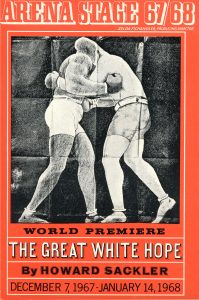
Original playbill for “The Great White Hope,” which Donatella analyzes in her book, “America in the Round.”
Q. How does your theatre background inform your methods or your approach to research?
Learn more about Donatella’s book: uipress.uiowa.edu/books/9781609386252/america-in-the-round
Or get in touch! ucriverside.academia.edu/DonatellaGalella
In Focus is a new interview series that features faculty associates of the Center for Ideas and Society.
In Focus: Robb Hernández
Robb Hernández
Arte Público, Project Lead, Humanities Interdisciplinary Project, 2018-19
Robb’s Stats:
Department: English
Rank: Assistant Professor
Years at UCR: 7 years
Favorite place: Boulder, CO (what can I say, I’m a proud hometown kid!)
Favorite film that I encourage students to see: Mona Lisa Smile (Columbia Tristar, 2003) I love the way that Katherine Watson (played by Julia Roberts) is able to use the modern art and radically transform students’ perception of themselves and the world around them in 1953 Wellesley College. Plus, the film gives an an ordinary Van Gogh paint by numbers the platform it deserves!
iPhone or Android: iPhone!
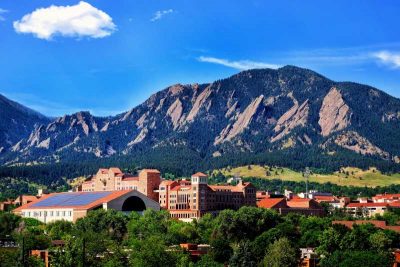
Robb’s hometown, Boulder, Colorado.
Q. Summarize your research in one sentence…
I elucidate how the aftermath of AIDS activated alternative archives, radical modes of queer preservation and custodianship for queer Latinx artists ravaged by disease and devastated by cultural neglect.
Q. Is there a key question or thread that runs through your work?
I am centrally interested in not only how AIDS generated another afterlife for Latinx art beyond institutional mediation but also, how Latinx art might be redefined when we confront the lost oeuvres and visual vocabularies of queer artists little known because of the consequential erasures caused by AIDS.
Q: What are you working on now?
My current project is retracing the speculative impulse in contemporary Latinx and Latin American art and thinking through how charged nativist discourses of “the alien” have engendered empowering iconographies, personas and otherworldly possibilities. By empowering the alien as a cosmic action, optic or perspective, Latinx artists circumvent the paralyzing reality of borders, walls, and militarized detention by looking skywards.
Q: Why is teaching important to you?
As a professor and curator in the Inland Empire, exhibition venues are rare and artist infrastructures are lagging. The classes I teach at UCR, a Hispanic Serving Institution, are often the first to engage Latinx students in the art museum as a site of research and social practice. Indeed, the disparities surrounding Latinxs entrance into the museum profession and even the field of art history, archive/information studies, and/or cultural heritage studies are staggering. Despite the burgeoning Latinx demographics in Southern California, the demand to rectify this egregious shortfall is critical. I continue to introduce students to the powerful role of museums and archives because curating Latinidad has never been more pressing.
Q: Any new or exciting developments?
My exhibition, Mundos Alternos: Art and Science Fiction in the Americas, will travel to the Queens Museum and Leslie Lohman Museum of Gay and Lesbian Art in New York City this spring (opening in April 2019). My co-curators and I are elated to bring UCR’s accomplishments in speculative studies, science fiction, and Latinx studies to new audiences on the east coast.
Q: What are three influential texts that you rely on?
Some texts that have historically stirred my ideas include Richard Meyer’s Outlaw Representation and in particular, his writing on Robert Mapplethorpe’s living room as a mode of furnishing desire. Jennifer Gonzalez’s Subject to Display on race, installation art, and material memory was a critical lynchpin in my thinking early on as a graduate student in American Studies. Lastly, Simon Doonan’s Confessions of a Window Dresser placed all things I love into center focus: queer memoir and extravagant tales of 80s fashion and shopping culture in LA, London, and NY. Doonan would share a small story about a young Chicano artist named Mundo Meza, which would have an unexplainable aftereffect on me changing the direction of my research and professional career in archiving and curation.
Learn more or get in touch with Robb: english.ucr.edu/people/faculty/robb-hernandez
In Focus is a new interview series that features faculty associates of the Center for Ideas and Society.
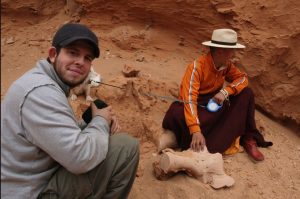
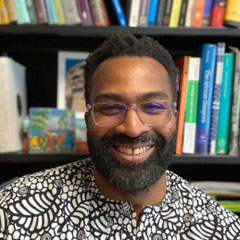
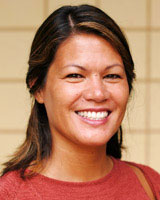
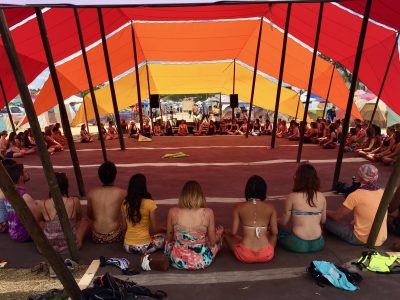
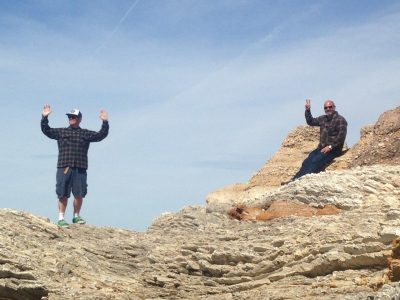
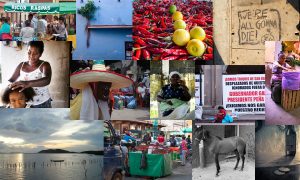

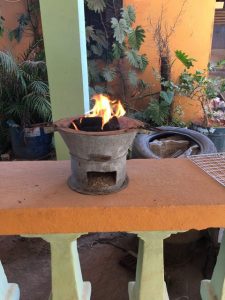
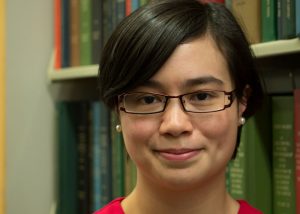 Donatella’s Stats:
Donatella’s Stats: